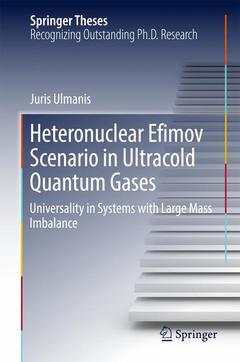Description
Heteronuclear Efimov Scenario in Ultracold Quantum Gases, Softcover reprint of the original 1st ed. 2017
Universality in Systems with Large Mass Imbalance
Springer Theses Series
Language: English
Keywords
Effimov Effect; Universal and Nonuniversal Physics; Feshbach Resonances; Solution to the Three-Body Problem; Ultracold Atoms and Molecules; Discrete Scaling Symmetry; Bose-Fermi Mixtures; Ultracold Gases with Mass Imbalance; Born-Oppenheimer Approximation for Efimov Physics; Efimov Trimer with Two Species
Heteronuclear Efimov Scenario in Ultracold Quantum Gases
Publication date: 03-2017
Support: Print on demand
Publication date: 03-2017
Support: Print on demand
Heteronuclear Efimov Scenario in Ultracold Quantum Gases
Publication date: 05-2018
Support: Print on demand
Publication date: 05-2018
Support: Print on demand
Description
/li>Contents
/li>Biography
/li>Comment
/li>
This thesis represents a decisive breakthrough in our understanding of the physics of universal quantum-mechanical three-body systems.
Introduction.- Two-body Interactions Between Li and Cs Atoms.- Universality of LiCs2 Efimov Resonances.- Short-range Effects in LiCs2 Efimov Resonances.-Conclusion and outlook.
Juris Ulmanis is a postdoctoral researcher at the Physics Institute of Heidelberg University, Germany. He studied physics at the University of Hannover and the University of Latvia, where he obtained a M.Sc. degree in physics with distinction in 2010. Thereafter he was awarded a DAAD scholarship for doctoral studies in Heidelberg University under the supervision of Prof. Dr. Matthias Weidemüller. He completed his doctoral degree in 2015 with the highest distinction and now continues exploring quantum physics of atomic and molecular systems under extreme conditions.
Nominated as an outstanding Ph.D. thesis by the University of Heidelberg, Germany First demonstration of scaling behaviour in Efimov physics in heteronuclear system Provides a tentative understanding of all important properties of the Efimov scenario for systems with large mass differences Includes supplementary material: sn.pub/extras
© 2024 LAVOISIER S.A.S.




